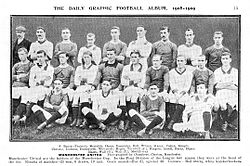 The Manchester United team posing with the trophy | |||||||
| Event | FA Charity Shield | ||||||
|---|---|---|---|---|---|---|---|
| |||||||
| |||||||
| Date | 27 April 1908 | ||||||
| Venue | Stamford Bridge, London | ||||||
| Attendance | 6,000 | ||||||
| Weather | Rain, turning to drizzle | ||||||
| Replay | |||||||
| |||||||
| Date | 29 August 1908 | ||||||
| Venue | Stamford Bridge, London | ||||||
| Referee | J. Howcroft, Lancashire | ||||||
| Attendance | 50,000 | ||||||
| Weather | Dry and clear | ||||||
The 1908 FA Charity Shield was the first Charity Shield, a football match contested by the winners of the previous season's Football League and Southern League competitions. It was intended as a replacement for the Sheriff of London Charity Shield, after The Football Association declined to provide a professional club to the organisers of that event for the annual amateurs vs. professionals match. The new match was subsequently arranged to take place at Chelsea F.C.'s home ground, Stamford Bridge. Following the conclusion of the respective leagues, 1907–08 Football League winners Manchester United were scheduled to play against 1907–08 Southern League champions Queens Park Rangers. [1]
Contents
- Match
- Background
- First half
- Second half
- Details
- Replay
- Background 2
- First half 2
- Second half 2
- Details 2
- Post match
- References
- Specific
- General
The first match was played on a very damp pitch in poor weather and ended in a 1–1 draw between the two sides, with the QPR goalkeeper Charlie Shaw also saving a penalty struck by George Stacey. Following the match it was thought that the two sides would share the honours, but instead at the suggestion of Arthur Kinnaird, 11th Lord Kinnaird, the match was replayed in late August. It was once again played at Stamford Bridge and the two teams fielded most of the same players with only a few exceptions. On this occasion the weather was far improved and the attendance by spectators was far higher with 50,000 fans attending. Manchester United won the game by four goals, and between the two matches more than £1000 was raised for charity.
